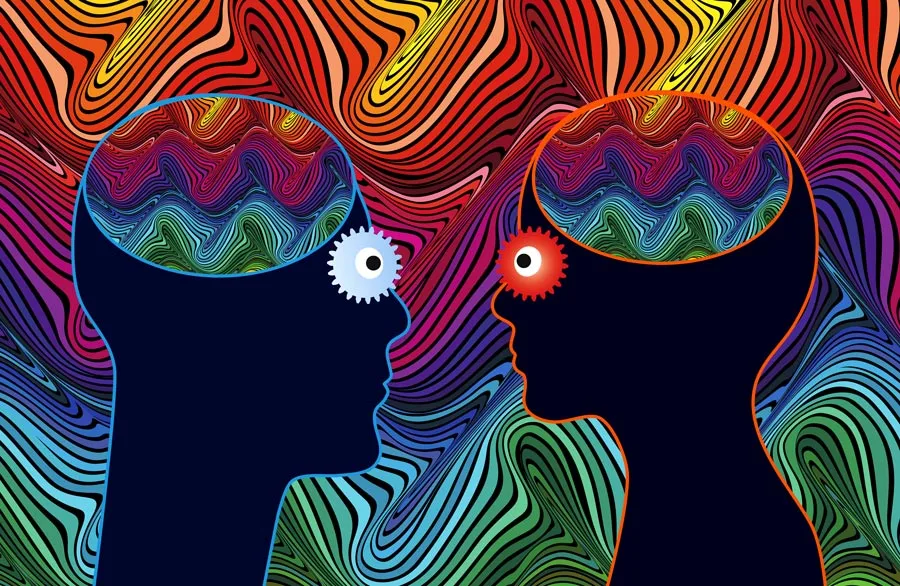When an argument ensues regarding drugs with the potential for addiction, there are staples that surface during any conversation on this topic. Heroin, fentanyl, meth, cocaine – these are all drugs you expect to be associated with the word “addictive.”
However, we’d bet a fair amount that most people wouldn’t include the drug DMT in these conversations. That’s assuming that both parties in the conversation are even aware of DMT’s existence.
In the world of chemical substances and illegal narcotics, DMT is not known for being one of the more widely recognized drugs in the book. Aside from a core base of electronic music and jam band fans chasing the remainder of what was once known as the Grateful Dead, not a lot of people are on a first-name basis with the drug.
Those who have, however, place their experience with DMT on the same level as a face-to-face meeting with God. DMT is rumored to have connections with the third eye and astral plane, having earned the nickname the “spirit molecule” for the psychedelic pilgrimage users take while under the influence of the drug.
What is this unique substance, and why is it so obscure? In this article, you’ll find out about DMT and whether this hallucinogenic is addictive.
What Is DMT?
What is DMT? DMT, or N, N-dimethyltryptamine in medical talk, is a hallucinogenic tryptamine drug found naturally in the human body and plants. This psychedelic substance falls under the Schedule 1 category, meaning it’s illegal across the board (possession, selling, manufacturing, etc.). A couple of cities in Oregon and Colorado have decriminalized it, but other than that, the federal government doesn’t look favorably upon any DMT activity.
DMT is the primary ingredient in ayahuasca, created from a combination of the Banisteriopsis caapi and Psychotria Viridis plants. The second contains MAOI, which stops your body from experiencing the effects of DMT – thus, the need for both when producing the final product.
Chemists can also synthesize DMT in a lab without using plants, creating a product similar to the plant-based variety. In its final state, DMT is a crystalline substance, ranging in various colors.
Traditionally, DMT is smoked, but users may also consume it in tea. Regardless of the means of consumption, DMT produces a highly potent effect, unlike any other substance.
What Effects Does DMT Have?

DMT has some insanely strong effects for users who smoke it. It only takes about three seconds to kick in, and while the high only lasts a few short minutes, it can feel like a lifetime to some users. After the user inhales a hit of DMT, they usually hold the smoke in for about five seconds.
Before they can exhale, they’re sent on a trip unlike any other they’ve ever experienced. Users report a wide variety of effects after consuming the drug, including:
- Out-of-body experiences
- Auditory and full visual hallucinations
- Encounters with tiny “elves” (known as DMT elves)
- The ability to “see” and “feel” other peoples’ energy. Many users report the ability to view people at a cellular or energy level or viewing them only by their body systems (circulatory, etc.)
- Paranoia
- Increased heart rate
- Increased blood pressure
IS DMT Dangerous?
One of the main concerns with DMT is the fact that each experience is incredibly unpredictable. In addition, it’s hazardous for a user to consume the drug on their own.
It’s not uncommon for users to exhale a DMT hit and collapse or lose control of their bodies. Most of the time, the user drops the glass pipe used to smoke the DMT, coming out of their trip without knowing what happened before they entered it.
DMT is dangerous for several reasons. Number one, the risk of engaging in use alone could lead to severe injury or death. It’s not uncommon for DMT users to fall and crack their heads open after losing control of their motor functions.
Second, it’s an extremely intense mental high. DMT is considered one of the most potent hallucinogenic drugs in existence. Substances like DMT can easily cause psychosis or trigger other underlying mental conditions, leading to permanent behavioral or cognitive damage.
Is DMT Addictive?
Is DMT addictive? Upon first hearing this question, most individuals would say no – even people who personally abuse the substance themselves. However, after considering the facts surrounding its abuse, we’re not so sure if we agree.
To answer the question, it helps to look at the definition of addiction. Addiction is the compulsive, chronic, or psychological need for any particular substance despite the awareness that using it could negatively affect at least one area of your life.
Let’s take a look at the elements in play here:
Is DMT dangerous to use?

Yes, it’s widely considered an unsafe drug. Whether the user agrees with this is irrelevant. The drug still poses dangers whether the user agrees with them or not. They’re at least acutely aware of the fact that other people consider the drug dangerous. At the minimum, they’re aware of its illegality, which poses a threat just as significant as the physical and mental dangers.
Are there veteran users of DMT who perpetually consume the drug despite knowing these things?
Yes. It might not be physically addictive, but it is habit-forming, and users may be required to ingest more to achieve the same effects they experienced earlier in their interactions with the drug.
Signs of DMT Addiction
It could be challenging to spot DMT addiction, especially considering most social circles’ minimal knowledge regarding the drug. However, certain behaviors and activities could tip you off to the potential existence of a problem.
- Individuals spend a significant amount of time-consuming DMT, especially on their own with no supervision.
- Users may lie about how often they consume DMT
- Users appear to be disconnected from reality
- Enlarged pupils
- Rambling about things other people can’t see or understand
Can You Overdose on DMT?
Technically, no medical state describes someone as “overdosing” on DMT. However, it’s possible to overdo the consumption of DMT grossly.
Ingesting too much at once via smoking or drinking it in a tea can produce hazardous and unwanted effects. Dangerous, extended, and highly intense psychedelic trips are known to send people off into a high they never return from.
Overusing any psychedelic is typically what manifests underlying or new mental health disorders that weren’t noticed before. Usually, these situations pass, but they can stick around for extended periods.
The Risk of Serotonin Syndrome
When users ingest DMT, the brain releases a large burst of serotonin. This is common in most chemical substances and leads to the high’s euphoria or “feel good” portion.
However, releasing too much serotonin in one sitting, over and over again, can lead to a condition known as serotonin syndrome. This is the body reaching the serotonin toxicity level and could technically be considered an overdose of serotonin.
Severe cases lead to seizures, respiratory arrest, and other severe side effects. However, most patients rarely require hospitalization and pass without much incident.
Does DMT Addiction Cause Withdrawals?
DMT addiction doesn’t directly cause withdrawals in terms of what most people consider withdrawal symptoms. However, it can hurt the user who has decided to quit.
Mental issues, vertigo, paranoia, difficulty concentrating, and anxiety are expected during the DMT detox period. Certain medications can help these side effects until the detox period is over.
Can I Get Help for DMT Abuse?

Regardless of what anyone says, any substance could warrant the need for rehab at any given time. Who’s to say that one person doesn’t have an issue with a substance that requires professional help?
If you’ve experienced DMT abuse, it’s possible you could require heavy mental health treatment, including dual-diagnosis therapy or cognitive-behavioral therapy. Other effective DMT treatment includes:
- Art therapy
- Equine therapy
- Ocean therapy
- Journaling
- A variety of holistic solutions
Long-Term Recovery from DMT Is Possible
Long-term recovery from DMT is possible with the right treatment team, armed with the proper knowledge and passion for witnessing you succeed. At Best Rehabs In Arizonas, we’ve helped thousands of clients just like you overcome challenges with DMT and other hallucinogenic substances.
We understand how delicate the situation can be when dealing with chemicals that alter the fragile balance of the brain. We’re here to provide support and various therapy options to help align your mind, body, and spirit in the healthiest way possible.
If you have questions, we encourage you to contact a member of our admissions team today. We’re standing by to take your calls!

